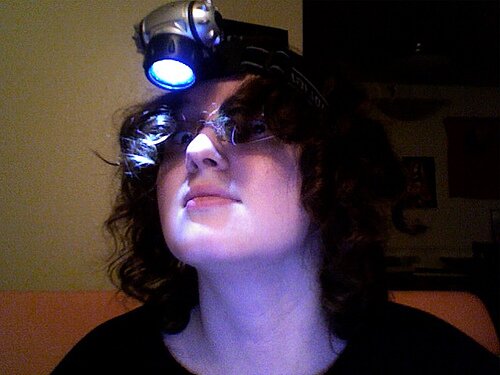(Originally written for Social Work prn.)
I’m reading Cory Doctorow’s Makers as a free digital ebook on my iPhone—truly a state of bliss for me—and I’ve just gotten to the part where he makes me really shake in my boots. Not in fear, not anxiety, not exactly. This shaking in my boots is a precursor to change. The kind of shaking that happens when you have just tasted the beginnings of something big that’s coming. (And maybe the kind of shaking that happens when you can’t bear the suspense of waiting for it to arrive.)
There’s this state of being that I’ve identified for myself, mostly in the past year, as being a large and important part of any person. It’s the state of feeling a certain way without being able to explain it. I often feel, in fact, that there is not necessarily an enormous amount of value in explaining it, or sticking labels on it, or (especially) justifying it. We explain ourselves so often, we forget what we’re feeling and we forget to honor that feeling. I notice this in other people, too—that there is something fundamental going on in their head, and it is diluted and perhaps disrespected a bit when they open their mouth and try to analyze something that isn’t ready to be analyzed.
This from the gal who analyzes everything, I know.
And I don’t think that explanation, or definition, or analysis, are bad things. But I do think that we depend on them more than we need to, and sometimes allow them to overwhelm deep understandings that haven’t had enough time to rise to the surface and start to make sense, all on their own.
This is the feeling I always had in regards to makers: I recognized something in them that was also in me, I was fascinated by the odd and wonderful art and machine work I came across on the internet, I knew that these people were kindred spirits in some way—but I didn’t quite understand how. I could not identify or explain the feeling, and I know now that it doesn’t matter that I couldn’t identify or explain it, because it worked itself forward in my head, and now I think I do. At least, I think I might.
Like me, a maker wants to find a new path forward. Wants to make something better, happier, more functional. Wants to express himself and connect with the world, wants to understand how something works, wants to rebuild it as a new reflection of himself. Wants to make a mark somewhere. Someone who experiences the thrill of tinkering, of producing, of setting something down in front of the world and saying, Check this out. This is really good.
I quoted Dale Dougherty in my blog, ages ago. He said,
“More than mere consumers of technology, we are makers, adapting technology to our needs and integrating it into our lives. Some of us are born makers and others, like me, become makers almost without realizing it.
“Maybe it started when I burned my first music CD … Maybe it started when I got Wi-Fi working, not for myself but for my whole family … Maybe it started when I brought my digital camera and laptop on vacation and found that my slideshow was ready before the vacation was even over.”
~ Dale Dougherty
MAKE Magazine, Issue 1
Don’t get confused—this isn’t just about technology, though referring to
makers in the usual sense often does have something to do with tech, or machinery. There is a deeper thread here that I think you’re familiar with too. The first time you realized that you could make a difference for another person’s experience, do you remember that? “Tinkering” can have a negative connotation when we’re talking about people’s heads and lives, but just think about it for a second. What you do, day after day, is building and making better. It isn’t all that different from adjusting a found piece of machinery to easily do a new task. And it’s a hell of a lot more complicated, and you have to be a hell of a lot more careful.
But it’s still a kind of making.
When I got to the part of Doctorow’s book where the main characters felt a sudden important urge to build tech that could directly improve the lives of the homeless people living in the shantytown near their workshop—not just importance, but necessity—it clicked. This is what we do. And we like the work. “Some of us like solving puzzles a bit more than we like solved puzzles,” Mann & O’ Brien sure do have it right. But we really, really like solved puzzles.
So when I’m shaking in my boots, anticipating a shift… this is what I see. The solved puzzles. The ability of a
work of fiction (that in many ways isn’t a work of fiction at all) to change the lives of people all over the world, to create a society that looks for the puzzles and works to solve them, that cares about people, and expression, and the sheer joy of making things a little better for everybody… that blows my mind.
And I wonder what else happens when we have a world like that.
Tagged as: cory doctorow, makers




Comments on this entry are closed.